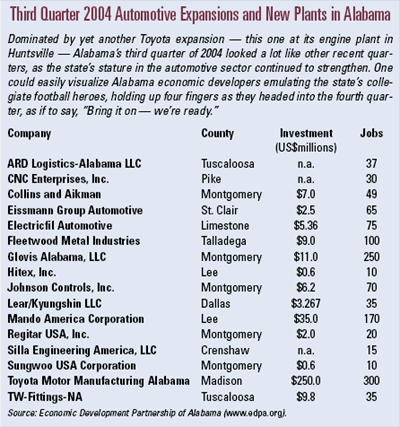Resilience and Flexibility
Built-in Features of Alcoa Team
Built-in Features of Alcoa Team
Following a model that the company also used in developing its Cleveland, Ohio, transportation center, Alcoa Automotive's real estate team, headed by Jim Winter, worked with a larger group that included real estate services consultant Fischer & Co., Kojaian, Synergy, Grubb and Ellis, assorted specialized service providers, the Michigan Economic Development Corp., and Farmington Hills economic development and chamber of commerce groups.
Tony Antone, vice president of development for Kojaian, says the company, which started as a fruit market in southeastern Michigan, now owns nearly 25 million sq. ft. (2.3 million sq. m.) and 13 corporate parks, including around 1,000 acres (405 hectares) in Farmington Hills. In addition to the Alcoa project, Kojaian is working Southeast Michigan projects with automotive companies in Northville, and in its Cherry Creek developmnet, which counts Delphi among its tenants.
Antone calls Kojaian's Farmington Hills property "the last large great piece in Southeast Michigan." Echoing why Farmington Hills itself is such a choice central suburban location, Antone says, "A lot of folks don't want to be too close to any one of the OEMs." Thus is the developer in
 |
Jim Winter, manager of corporate real estate for Alcoa, has anywhere from 150 to 200 lease, divestment or acquisition projects on his plate at any given time. Helping him dish out the execution is corporate real estate partner Fischer & Co., which was represented on the Farmington Hills project by Brian Sapp. Sapp says one of the obstacles to this kind of business unit consolidation is the natural concern over space allocation. But when even company vice presidents will be occupying cubicles, that concern tends to dissipate. And the exigencies of both real estate and strategy, backed by a positive and contagious corporate culture, nearly zapped it entirely.
In 2002, the company's three automotive units occupied 99,775 sq. ft. (9,269 sq. m.) in three leased properties in Livonia, Southfield and Farmington Hills, as well as a test lab in Dearborn that has remained untouched. Two leases were to expire in 2004, with Livonia's set to expire in 2007.
The Livonia property in particular — focused on castings, wheels and advanced transportation systems — was dominated by private office space. "We got the message there that private offices were important," says Sapp. "They said the right things, but there was an underlying doubt" about the company's plan.
Nevertheless, the process unfolded, with more than 20 sites involving both existing buildings and build-to-suit options coming under scrutiny. Sapp called Kojaian "unbelievably resilient" as the battle of proposals ensued. Local community incentives were evaluated, although, as Sapp indicates, MEDC incentives were out of the question, as they would only be triggered if the search involved an out-of-state option. " 'We might move to Cleveland' would have been a thinly veiled approach," says Sapp.

